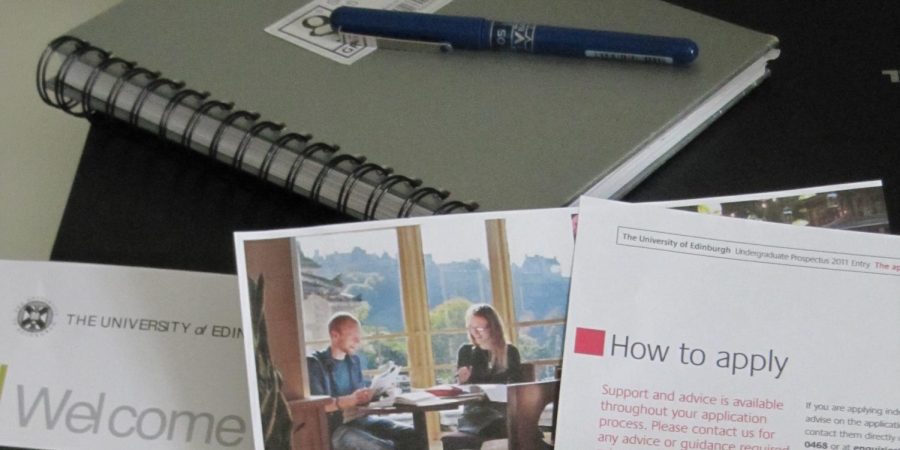The College Fright
The college admissions and post secondary processes are highly flawed. However, Liberty works to create a more productive culture surrounding these processes.
Every year millions of students apply to colleges and post-secondary institutions (public domain leisure CC0 image).
College admissions, a defining experience for many American high school students, is often considered a marker of success in a student’s life. An entire industry surrounds the process, ranging from prep books, to programs, tutors, and scandals. As the number of students applying to college grows every year, colleges become increasingly selective and disparities in the process only more clear.
Over four out of every five Americans believes the college admissions process is unfair. In recent years, scandals and lawsuits have allowed the public to understand the admissions process of selective colleges in a way they never had previously. Economic disparities, for example, are very clear. According to the New York Times, students from families in the top 1% are 77 times more likely to attend an Ivy League institution than those from families who make $30,000 or less a year.
Not only is the process far from equitable, it also causes many students high levels of stress. As college admissions become more competitive, many Liberty students feel more pressure to “stand out.”
Maxwell Thompson, 12 who is currently going through this process said, “I would say yes, [the college admissions process has caused] quite a bit of stress. I would say that it was a common experience. Again, the biggest stress factor was the essays, because that’s really the place where you get to argue your case, show that you are interesting and unique.”
Many push themselves with extracurricular activities and academic pursuits. According to Finance Online 66% of students report “often or always feeling worried about being accepted into their chosen college.”
“I think in my friend group I was the one applying to the most colleges, but they all talked about the stress of their essays, and waiting on the decision,” said Thompson.
Many Liberty students have a “dream school.” Increasing competitiveness in the process can cause students to sacrifice their mental health for their application.
“Kids can have dreams and aspirations and these desires to go to a certain college but what we really want them to do is to dig in early for what college or post-secondary plan is good for [them],” said Shely Bryce, counselor.
However, all students are not working on an even playing field. The system is built in a way which allows wealthy families to have a massive advantage if they choose.
One of the clearest examples of this is standardized testing. Though no longer required at many institutions, it is still a major factor in the process. Students from wealthy backgrounds have access to countless resources, causing them to have a massive advantage over low-income students. There are significant differences in test scores by student income according to Inside Higher Ed. The highest average-scoring students on the SAT come from families making $200,000 or more, and the lowest average-scoring students on the SAT come from families making $20,000 or less.
This high-stress process can lead to stigma or pressure surrounding attending certain institutions. However, Liberty works to combat this phenomenon.
“I think Liberty is getting better and better [at helping kids on whatever post-secondary path they choose]. I think advisory is helping with that… I think it’s something we have to always work on,” said Bryce.
These are not the only areas of contention in the process. In recent years, affirmative action has been called into question and eliminated at many schools.
Affirmative action is defined as, “a set of procedures designed to; eliminate unlawful discrimination among applicants, remedy the results of such prior discrimination, and prevent such discrimination in the future,” according to Cornell Law School.
It began in 1965 and continued for decades. However, in recent years many have argued that affirmative action causes fewer Asian and white applicants to be accepted than would have been otherwise, if race was not considered.
This line of thinking is what led schools like the University of California, Los Angeles (UCLA), and the University of Michigan to eliminate affirmative action. This caused an almost immediate fall in the numbers of black and Latino students at both schools. In 2006, only 96 out of 5,000 students attending UCLA were black. The University of Michigan followed a similar trajectory. This is especially notable as it is far from representative of the location of either school. Similar situations have led to contention and discussion at many universities.
The appropriate plan regarding affirmative action is unclear. However, it is another area in which the current college admissions process is arguably not equitable.
The college admissions process is deeply flawed. Inequality and high stress are embedded in it. However, understanding the process can allow students to better navigate it. This is one reason Liberty’s ‘advisory’ focuses on educating students on their post-secondary options and the processes surrounding them.
“I can see [the culture of college applications at Liberty] starting to build up during advisory time when they are trying to help students with applications and scholarships, and figuring out what they want to do. I know it’s an unpopular opinion but during advisory time, especially for Juniors and Seniors, is when you can get some really good help with your college decisions,” said Thompson.
As Liberty continues to grow they can focus on combating the obstacles with college admissions. However, nationally the process may require more drastic change.

Leela is a senior at Liberty High School. This is her second year on the Live Wire staff. At Liberty, Leela plays tennis and is part of SEA club. Outside...








